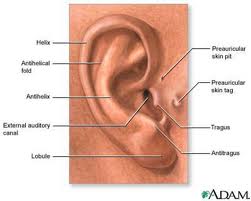
Ears
BOYS and girls, did you ever hear of a person having four ears? A minister once made the statement to a congregation of little hearers, whose attention he was anxious to secure, that “children have four ears." Said he, "Their eyes are their ears; they hear with their eyes; and if I see a child looking at the speaker, I know that he hears him." You will do well always to remember this when a person is speaking to you. It is pleasanter for the speaker to have the attention of his hearers;
and you, if you look straight at him while he is talking, will be sure to get the best he has to say.
All talkers like good listeners, and if their hearers are attentive, ready to catch every word that is said, the speaker will do his best to say something worth hearing and remembering.
Did you ever try to relate a story, or some bit of news, to a person who, although he pretended to be listening, was looking in every direction save at you? If so, you know a little of the experience of a speaker under like circumstances, and how hard it is for him to be interesting without listening eyes to help him.
An eloquent minister once said that two or three good listeners, who always looked straight at him, helped him much in preaching; that he preached better sermons for his whole congregation for just two or three who heard all he said, and seemed to care for what he preached. If a few interested hearers can be of such help to a minister by "looking straight at him," what might we not expect of him should the whole congregation be equally attentive? Try it, dear children, in the house of God, and in the Sabbath-school, and see how your attentive habits will encourage the minister, the superintendent, and the teachers.
We believe you will report the most interesting seasons you have ever enjoyed.
Two thoughts cannot occupy the mind at the same moment; and if your eyes are wandering about at the time you are trying to hear, your attention will be more or less taken up with the things upon which your eyes rest, and you will lose much that is said. We wish we could impress
your minds with the importance of forming habits of close attention. If you engage in conversation, or listen to the words of another, fix your eyes attentively upon the speaker; and whether you have opportunity to gain knowledge by the ear, or by the eye, notice as closely every particular point of what is said or done, as you would were you obliged afterward to relate all you saw or heard.
Such habits formed will be the best investment you ever made.
This habit of observation will also help you in talking; for those who hear well, usually lay up a good store of useful knowledge, and command choice words to express their ideas to others. So begin early the habit of close attention, and you will acquire a mine of knowledge. Try it, young friends, will you not?
M. J. C.